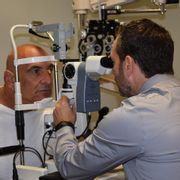
Allergies are common, especially during the spring and fall seasons when pollen and mold counts rise. Eye allergies may cause a variety of uncomfortable symptoms that prevent you from seeing clearly. Below, you’ll learn more about how to identify these issues and how eye care experts suggest relieving them.
What Can You Do About Eye Allergies?
Why Do Eye Allergies Develop?
 Allergies develop when the immune system becomes more sensitive to environmental phenomena, such as mold, mildew, pollen, and pet dander. When these allergens make contact with your eyes, they cause an allergic reaction. More specifically, antibodies in the eyes cause the cells to release histamines, which result in the leaking of blood vessels.
Allergies develop when the immune system becomes more sensitive to environmental phenomena, such as mold, mildew, pollen, and pet dander. When these allergens make contact with your eyes, they cause an allergic reaction. More specifically, antibodies in the eyes cause the cells to release histamines, which result in the leaking of blood vessels.
What Are the Signs & Symptoms?
The most common symptoms of eye allergies are redness, inflammation, itching, and watery eyes. Seasonal allergic conjunctivitis may also cause dark circles, runny nose, sneezing, and congestion. Vernal keratoconjunctivitis, which is a more severe eye allergy, may include all these symptoms in addition to mucus buildup in the eyes and sensitivity to light.
How Can You Treat & Prevent Them?
Non-prescription eye drops and antihistamines are often helpful for reducing redness, itchiness, and inflammation. You may need prescription tear substitutes and decongestants from an eye care specialist if your symptoms are severe, persist, or worsen. Prevent allergies by staying indoors on days when mold and pollen counts escalate. Change your HVAC filter once monthly, and remove dust from shelves and countertops once per week.
Experience relief from eye allergies with help from the team at Brunswick Optical. These eye care experts provide exams, contact lenses, and glasses frames to customers throughout Brunswick, OH. Call (330) 741-3407 to book an appointment with an optometrist, and visit the website to learn more about how they can improve your vision and eye health.
About the Business
Have a question? Ask the experts!
Send your question

